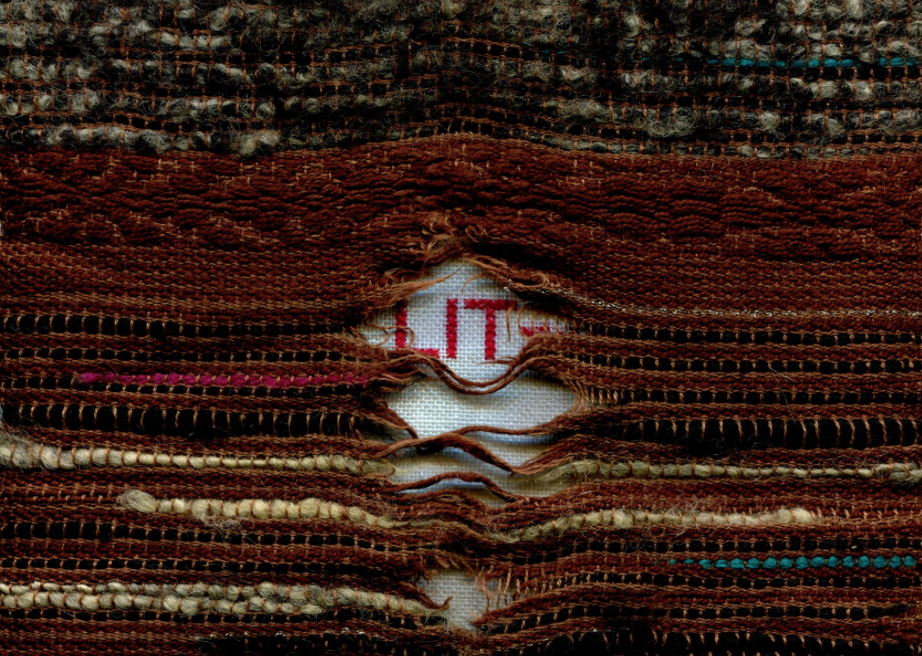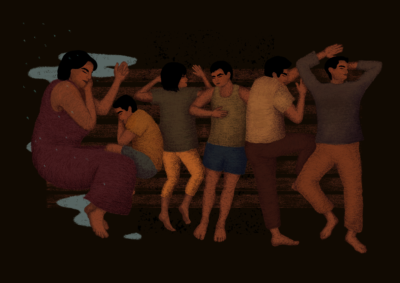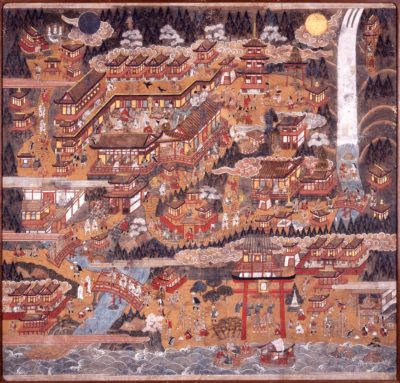
Excerpt from Adame by Rosalind Palermo Stevenson
What I like about living with Nandi is that she commands so little space, her presence is airy, she resides here lightly, and then of course she is always changing, from one mood to the next, each with its own distinct physical form. When I write, Nandi goes off by herself to swim in the ocean. I form the words on the page. I write myself page after page, while my companion swims with only her head visible, bobbing above the waves. Sometimes, when I am frustrated with my progress, I throw the pages against the wall. I think sky and ocean. I ask what else is there of consequence. I focus on the fog as it was this morning, thick and the sound of the foghorn, repeating in the distance, the lighthouse keeper at his work, the lighthouse in the distance, and Nandi swimming.
I hear Nandi return dripping wet, dripping water through the house. She goes to her room completely at home in this house, there is no question she exists to be here. Or here she exists. Perhaps only here we both exist.
She tells me she likes to watch the tiny crabs, or are they really insects? They disappear deep into the sand.
And, oh yes, there has been a message. It was from the man Albert, she tells me. She saw it written in the sand when she came out from her swim in the ocean.
__________I am watching, it said.
And oh yes someone sent a package. It arrived in the mail. Nandi points to a package sitting on the table.
Everyday the sense of absolute solitude, even with Nandi by my side.
I am in no hurry to open the package. In fact I feel resistance to opening it. Nandi thinks that all packages are presents and wants to open it, but she agrees to wait. Together we go outside and walk to the edge of the cliff where we look down at the ocean. I can feel it at its strongest. We look up to the sky and then back down to the ocean. It would be a long fall from the cliff. We stay a while longer and then turn back to the house. Nandi races ahead with her long legs. I walk slowly behind her. Once back inside she takes the package off the table and then tears it open from its wrappings.
This is the image: Nandi tearing and ripping at the industrial brown wrapping of the package.
It’s a book, she says. She opens it and looks through its pages. Then she hands the book to me.
I read the words on the first page:
__________July 13. I feel fragile. It is as though there is a great wave of tension moving through my
__________body. What part of me is woman and what part man?
__________August 1. The streets at 3 a.m. Men alone, beggars, moving in the shadows. I was on the way
__________home after a night of listening to opera.
__________August 7. The ocean calmer than usual. The waves breaking gently against the shoreline.
__________Stillness and quiet. Even the gulls and the other seabirds silent.
__________August 8. The next morning on the deserted beach with my body stretched out in the
__________direction of the ocean I am weeping as though emptying some great heaviness into the sea.
__________August 11. The authors of chaos. The violent action. The battle never coming to an end.
What does it mean Nandi asks, agitated. What does it mean? What does it mean?
The next day she is agitated again, insisting that I call her Shilluk. Shilluk, I say. And then she says, Shilluk. Shilluk, I say again. And then she says— her face—
Shilluk wants to go down to the ocean—this very minute, she says. She says it is of the utmost importance. Those are her words: It is of the utmost importance. She says there was another message from Albert and we must read it before the ocean washes it away. She looks at me astonished when I ask her how she knows. How do I know? How do I know?
I have fallen asleep with the lights on again and now wake up in the middle of the night. It hurts my eyes to open them into the glare. The window is open; the screen is covered with moths and other insects drawn to the light. I pick up my notebook and write this which I am now writing. The light makes the house a kind of beacon. Here where the house stands alone.
Shilluk sees the light beneath my door; she knocks and then comes into my room. She appears to be angry. That is one of the problems of living with a stranger. And then there is the question is she real. That is the problem when someone appears one day. Carried on many feet.
It’s raining.
The rain still hasn’t stopped. It continues through the morning into the afternoon. Shilluk holds a funnel to her ear. What did you say she asks? What did you say she repeats? She repeats and repeats. Outside the wind is howling.
There are spooks everywhere on the ocean shore as if coming down from the mist. When I was a child (and even later) I would creep up quietly on my mother and she would say, Oh, it’s the spooks. It was a game I played creeping up so I could hear her say, Oh, it’s the spooks. There’s a Spook Cave in Iowa. Flooded out with souls turned to water. And a Spook Hill in Florida taken over by ghosts, where cars have disappeared as they climbed up in old-time second gear. Someone was talking about the stars inside the body, not to be confused with cells. Someone else was talking about the distant planets.
The ape smugglers have returned and are in force again mixing up the fine day order ape soul. Our brother a bonobo who fought to his death. His eyes just before his death telling what they did not understand about the universe and its intention. The weather so perfect and yet his baby stuffed inside a plastic bag.
Dane Rudhyar tells us why this happened in our time of evolutionary change:
__________False starts are usually made—good intentions are perverted—deviated by the pressures
__________of unavoidable circumstances—mental and emotional confusion produced by fear of
__________letting go of the familiar—a fear bolstered by the influences of evil forces acting at the
__________level of psychic energy.
These are the ones who go forward:
__________The mutants (few) in whom the newly enacted archetype is successfully incarnated.
But these:
__________A few humans who react in a focused negative manner and become definite expressions of evil.
Dear A____, I have been thinking of you. I hope that all is well. I urge you to come and spend a few days. There are others here as well, but they only come into incidence of existence one at a time so you don’t have to worry that you will be crowded out. It’s been so long dear A ____, I find myself longing for your company.
Here are the names of those others: Nandi Lumbwa, Suk, Turkana, Dinka, Bari, Shilluk
Shilluk is talking about the movement of trains across the country. But I am talking about the movement of time, which I imagine as movement across the sky. The moon looked threatening last night at its half phase and cradled by clouds. Shilluk is standing in the doorway of my bedroom. It is a much taller Shilluk. There’s the smell of larkspur in the house. Is it larkspur? How did it get into the house?
Dear A____, any thoughts about the moon? Larkspur?
My thoughts in a glass.
I think I did not want to be here (of course now I don’t want to leave.) It was my mother’s idea I be here. She insisted. Waking me from sleep.
Shilluk sits down on my bed. She likes it when I read aloud. She is wearing her waiting expression. I continue reading from the book that arrived in the mail. It’s the diary of an unknown woman. I think how curious it is the way it resembles the details of my own life. And yet it is not mine.
The page begins with a list:
__________Favorite plays of the Japanese Nō Theater.
__________Komachi at Sekidera
__________The Deserted Crone
__________The Sought-for Grave
__________Komachi and the Hundred Nights
__________The Priest and the Willow
__________The Bird-scaring Boat
__________The Valley Rite
Notes follow the titles:
__________The tendency to remember the plays in terms of one prevailing emotion
__________Extremely few of the characters in Nō have an existence apart from the poetry they speak
__________Regardless of the emotions that may be assailing the shite, an artistic dignity and
__________detachment must be preserved
Everything is recorded. Somewhere a ball is thrown into the air. Shilluk is looking at me with her mouth closed tight. Sounds are coming from the floor above, or else from one of the other rooms on this floor. It’s impossible to tell just where they are coming from. One is like a clearing of the throat, and nasal. Perhaps only imagined. and yet, no, no, not imagined. And then there is a scraping on the floor above and footsteps although there is no one up there. Only Shilluk who is sitting across from me is in this house with me. Do you hear the sounds, I ask her. She says nothing. She only looks at me and then at the book on my lap. She wants me to read.
I look down at the book and read, ignoring the footsteps:
__________Keep your glance fixed to the sky; there is a message there such as those messages
__________written on the sand. The clouds are continually in motion. I try to keep myself within
__________myself…
Shilluk is sitting still as a stone. She asks, what does it mean?
She waits for my answer.
Lest we misunderstand
Words display themselves. As if by itself, a word.
I read the word ‘father’ and I think: My father. The explanation of my father. It is more a feeling than a thought. Here are five borrowed words: I will try to explain. There has always been so much to explain I say to Shilluk who is sitting next to me and becoming someone else. She thinks I don’t notice, but of course I do. It begins with a hardening around her mouth. Her hair is becoming lighter now. I will explain to you about my father I say to Shilluk. Oh, she says. Her expression softens at the word father. Yes, the word for me is also soft, I say; I have a soft feeling for my father. Where is father she wants to know. I say, Mom, Mom, where is Daddy. Or do I say, Mother where is Father? Or do I say Mama, where is Dada?
The story is ending I say to Shilluk, setting the book down on the bed beside me. Her eyes flash. She picks it up and puts it back on my lap.
broken glass… scattered everywhere…
the image of an angel with wings and only one leg
left off again without resolution
words everywhere… words among the broken glass…
*
Rosalind Palermo Stevenson is the author of the novel The Absent, the novella Insect Dreams, and the chapbook Kafka At Rudolf Steiner’s. Insect Dreams has also been published in the anthologies Poe’s Children (edited by Peter Straub) and Trampoline (edited by Kelly Link). Her experimental story “The Guest” is included in the anthology Wild Dreams: The Best of Italian Americana, and her short fiction and prose poems appear in literary journals including Spinning Jenny, First Intensity, Drunken Boat, Conjunctions, Washington Square, Skidrow Penthouse, Literal Latte, Italian Americana, and Quick Fiction. She lives in New York City where she is currently working with the concept of speculative autobiography and the female Adam in Adame.
© LIT Magazine Issue #32, 2018




